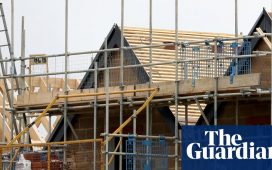Stay informed with free updates
Simply sign up to the Chinese economy myFT Digest — delivered directly to your inbox.
China plans to almost double credit support for a selected group of housing projects to Rmb4tn ($562bn) as part of official efforts to reinvigorate its property sector and turn around the economy.
The so-called whitelist was introduced in January and includes projects and developers eligible to receive further financing from local and state-owned banks to help them complete unfinished projects.
Approved loans for whitelisted projects this year total Rmb2.2tn, according to housing minister Ni Hong, who announced the move at a press conference in Beijing on Thursday. The new funds should be deployed by the end of the year, he said, enabling developers to finish construction. “We can definitely win this battle to ensure the delivery of housing,” Ni said.
The expansion of the credit support follows a recent push from Beijing to restore confidence in the Chinese economy, where a prolonged property slowdown has combined with weak consumer demand to raise calls for more fiscal stimulus.
Authorities in September unveiled measures to support the sector, including cutting borrowing costs and easing rules for purchases of second homes. These plans, which came alongside measures to boost the stock market, buoyed hopes of a major intervention.
Xi Jinping’s government, which initially intervened to reduce leverage in the property sector in 2020, has so far held back on announcing any direct stimulus, preferring instead to encourage China’s state-owned banking sector to provide more credit.
Previous policies include a November 2022 unveiling of bank credit lines and a May plan that aimed to mobilise state-owned enterprise purchases of unsold housing. The extent of bank participation has been unclear.
In a sign that the increased support fell short of investor expectations, the shares of Chinese property developers listed in Hong Kong declined on Thursday. The Hang Seng Mainland Properties index dropped 6.7. per cent on the day.
Zerlina Zeng, head of Asia credit strategy at CreditSights, said banks “might be reluctant to extend additional funding to incomplete home projects as they still need to bear the credit risk”. She added that a large amount of the money lent up to August through the whitelist programme was for refinancing existing debt.
Jeff Zhang, an analyst at Morningstar, said he expected an “acceleration in execution, with more distressed developers receiving funds for home completions, which would help shore up homebuyers’ confidence”.
China’s housing market is still dominated by newly constructed homes that are bought before completion, though purchases have this year shifted to existing properties amid concerns over developer health.
On Thursday, the housing minister said that since the end of September, the number of viewings and purchases of new homes had shown a “clear increase” and that transaction volume in the secondary market “continued to rise”.
New home prices in August fell at their fastest pace in nine years, with a 5.3 per cent drop across major cities, according to Reuters calculations.
Additional reporting by William Sandlund in Hong Kong











